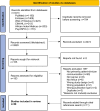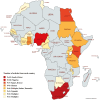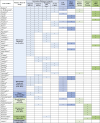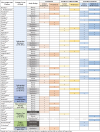A scoping review of clinical communication in cancer care in Africa
- PMID: 40212023
- PMCID: PMC12079379
- DOI: 10.1093/oncolo/oyaf039
A scoping review of clinical communication in cancer care in Africa
Abstract
Background: Cancer care involves disclosing difficult information, making treatment decisions, and advance care planning. Communication practices and preferences are strongly influenced by sociocultural context. This scoping review aims to identify, map, and appraise the available evidence on clinical communication in cancer care in Africa and recommend priorities for future work.
Methods: A search strategy was developed to identify studies conducted in Africa with a primary focus on patient-clinician communication in cancer care and performed in PubMed, Embase, Web of Science, CINAHL, African Index Medicus, and PsycINFO. Two reviewers independently screened titles and abstracts, full texts, and cited references. Study characteristics were analyzed using descriptive statistics and content analysis. Critical appraisal was performed using the Mixed Methods Appraisal Tool.
Results: Our search yielded 58 articles from 19 countries. Study designs were quantitative survey (53%), qualitative (38%), non-randomized experimental (5%), and mixed methods (3%), with no randomized trials. Populations included patients with cancer (n = 25), doctors (n = 24), nurses (n = 16), family/caregivers (n = 16), and/or others. Seven studies (12%) focused on pediatrics. Most studies (60%) focused on clinicians' disclosure of information, often framed as "breaking bad news" or "truth-telling." The remainder focused on information preferences (14%), advance care planning (10%), illness understanding (5%), shared decision making (5%), and communication training (3%). Critical appraisal demonstrated higher quality among qualitative than quantitative studies.
Conclusions: Future work should explore underexamined research areas such as patient-centered communication, translate observational findings into intervention development and testing, implement communication skills training, and evaluate outcomes related to communication in cancer care in Africa.
Keywords: Africa; Cancer; breaking bad news; communication; decision-making; doctor-patient relations.
© The Author(s) 2025. Published by Oxford University Press.
Conflict of interest statement
None.
Figures





References
-
- The International Agency for Research on Cancer (IARC). Global Cancer Observatory. Accessed April 2, 2022. https://gco.iarc.fr/
-
- Ngwa W, Addai BW, Adewole I, et al. Cancer in sub-Saharan Africa: a Lancet Oncology Commission. Lancet Oncol. 2022;23:e251-e312. https://doi.org/10.1016/S1470-2045(21)00720-8 - DOI - PMC - PubMed
-
- Epstein RM, Street Jr. RL. Patient-Centered Communication in Cancer Care: Promoting Healing and Reducing Suffering. National Cancer Institute, NIH Publication No. 07-6225; 2007. Accessed February 6, 2022. https://cancercontrol.cancer.gov/sites/default/files/2020-06/pcc_monogra...
-
- Street RL, Makoul G, Arora NK, Epstein RM. How does communication heal? Pathways linking clinician–patient communication to health outcomes. Patient Educ Couns. 2009;74:295-301. https://doi.org/10.1016/j.pec.2008.11.015 - DOI - PubMed
-
- Wright AA, Zhang B, Ray A, et al. Associations between end-of-life discussions, patient mental health, medical care near death, and caregiver bereavement adjustment. JAMA. 2008;300:1665-1673. https://doi.org/10.1001/jama.300.14.1665 - DOI - PMC - PubMed
Publication types
MeSH terms
Grants and funding
LinkOut - more resources
Full Text Sources
Medical
Research Materials

